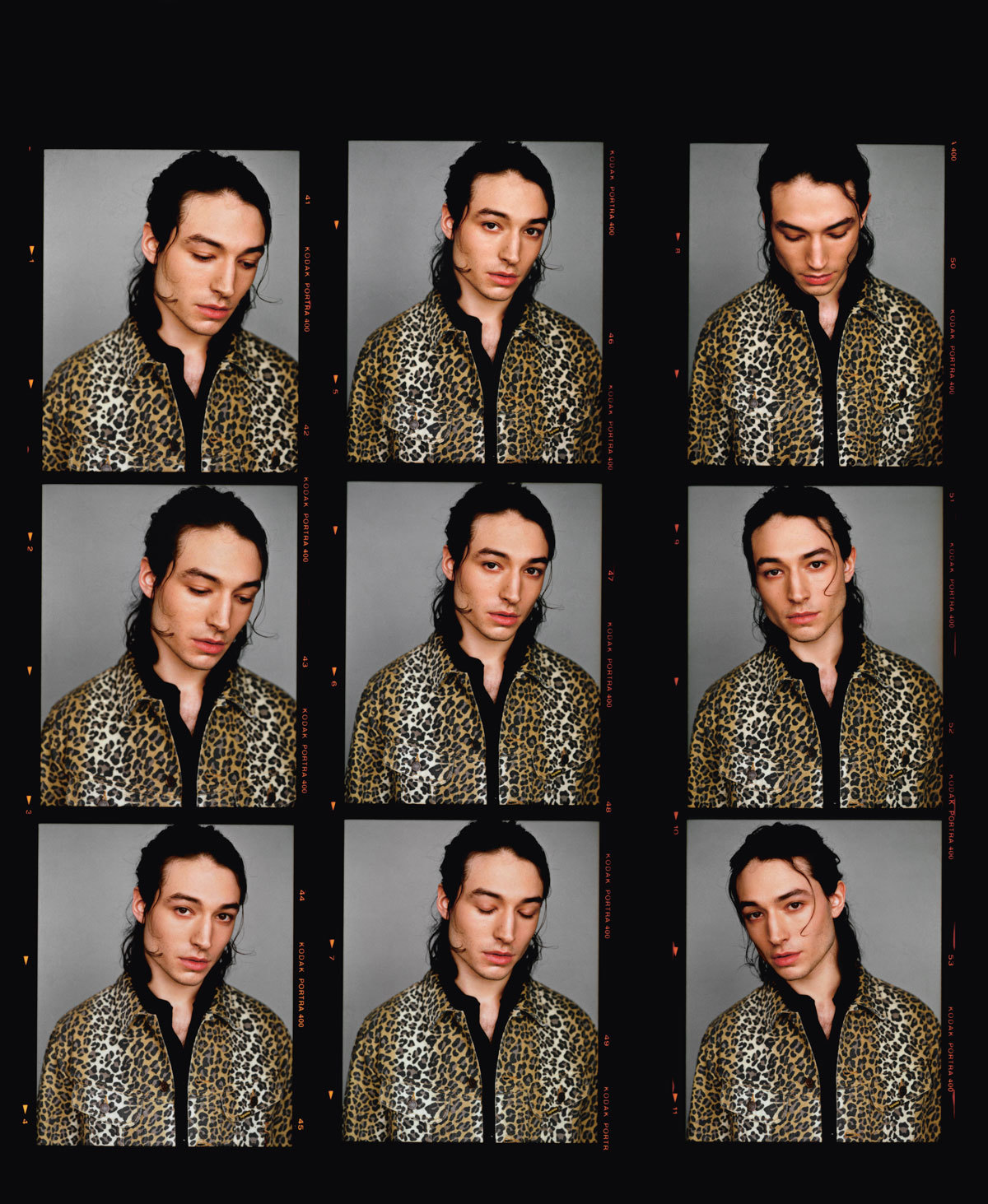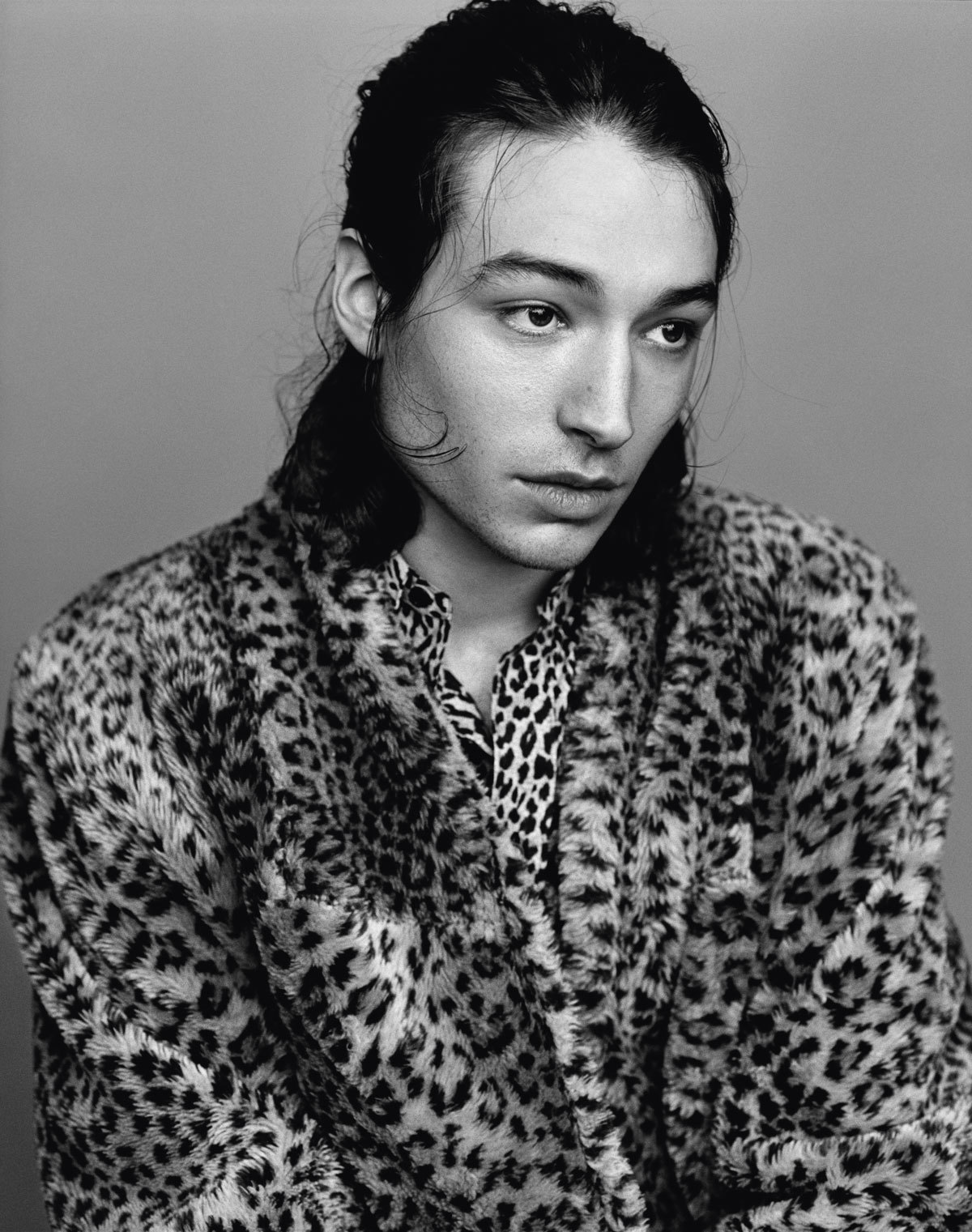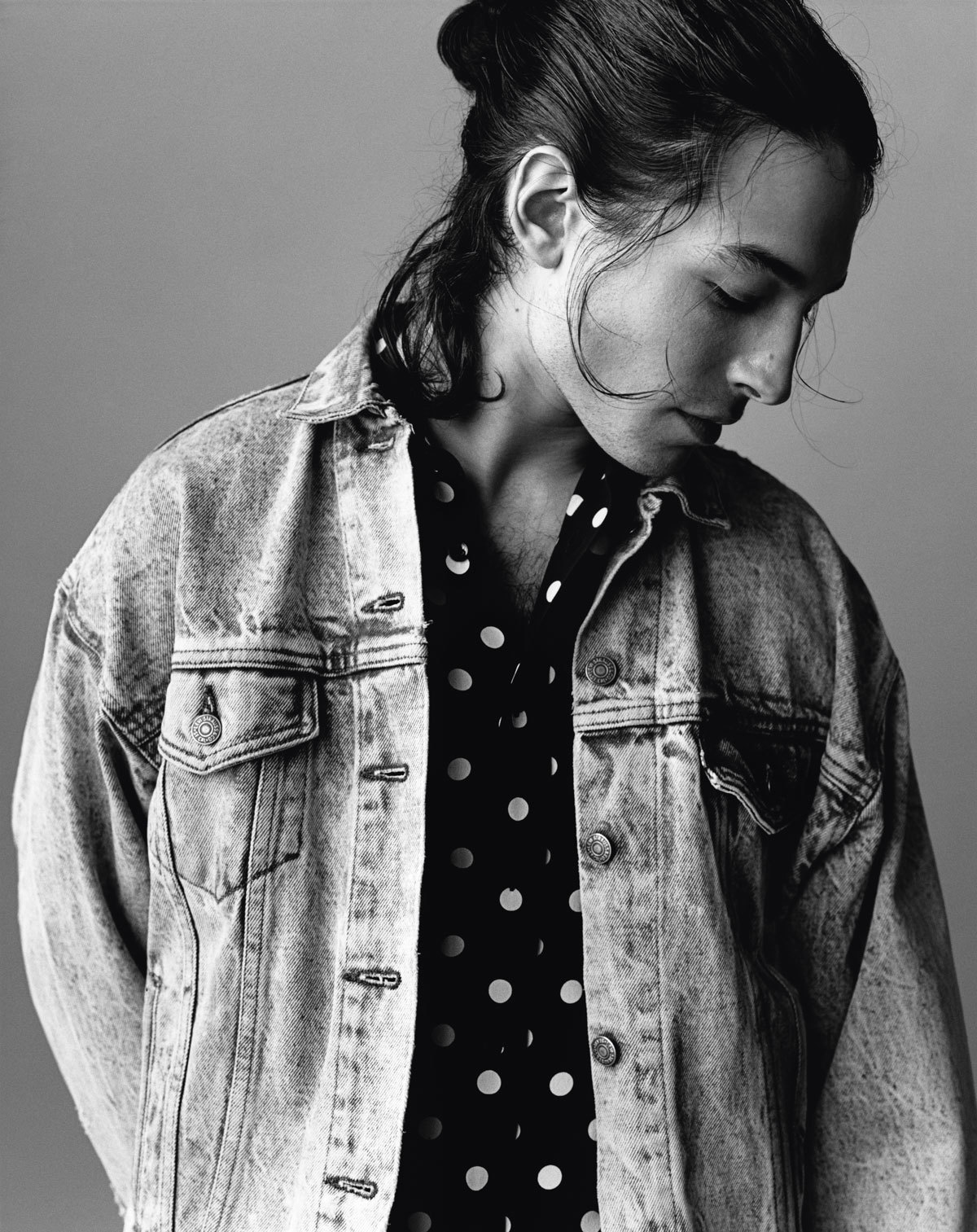Recently, Ezra Miller and a girl friend (romantic status unknown) snuck into the backyard of his New Jersey childhood home in the middle of the night. The frolic left him feeling nostalgic; it has been years since he lived there and commuted to the city as a precocious opera kid. Now 22, Ezra has had a crazy rise from theatre prodigy to cultural icon. As the ultimate American horror child in We Need to Talk About Kevin, and the charismatic Patrick in The Perks of Being a Wallflower (both adapted from cult novels), Ezra solidified his status as a superstar in training – all the more so after he discussed his marijuana use and queer identity, becoming something like the male equivalent of a manic pixie dream girl. But with roles in three films out this summer (Madame Bovary, Judd Apatow’s Trainwreck, and The Stanford Prison Experiment), gigs with his band Sons of an Illustrious Father, and a just-announced superhero franchise as The Flash, he’s more like a new-gen Brando: just as talented as he is unusual. When we meet, Ezra is wearing a leopard-printed coat and leather string necklaces. The kid has presence: he looks you deep in the eyes when he speaks, and like a lot of idealistic artists his age, he cares. He really cares.

Why did you leave the opera as a child?
I was told to leave when my voice changed, and when that happened there was a massive void that could only be filled by the performing arts. So I went to this summer camp called Buck’s Rock, a veritable utopia for a young kid privileged and fortunate enough to be able to go to a place like that. I went to the clown shop where they did improvisational comedy, sketch comedy, stand-up, and a little bit of genuine clowning. I was the weird, punk kid. A lot of people thought I was a girl; I had pink hair and wore aviator glasses. It’s probably to this day the most serious acting training I’ve had, which speaks more to the fact that I haven’t had much serious acting training than anything. I got kicked out of Buck’s Rock for smoking weed. We were almost martyred: there was a graffiti campaign, there were flash mob dances.
Why do you think performance was, and still is, so appealing to you?
Ultimately it’s exciting for a human being to realize that who they are extends beyond the confines of the identity they’ve been assigned. What was exciting as a kid is very much the same thing that’s still exciting. As a kid I would have expressed it as: I can be anything I want. Now, I might express it as: I can stretch my empathy as far as it can go, and I can hope to get a glimpse of this idea of a universal self.
What are the characteristics of a universal self?
That’s a question for the scientists and mystics rather than the pretentious actor.
Fair enough. Which character that you’ve played feels the closest to yourself and which feels the furthest?
Answering that question requires that I have a good knowledge of myself, which is something I’m working on. It’s easy to identify the people I’ve played who are psychopathic murderers as being removed from how I identify. It would also be easy to say that the exuberant, inspiring, and perennially energetic characters I’ve played would be closest to myself. But I’m not saying that.
How do you think acting in We Need to Talk About Kevin at such a young age affected your path as an actor?
Playing Kevin was an incredibly enriching and informative experience. It challenged me, forced me to expand my horizons, and try to bring my game up, to hold ground with these masters I was working with. I had nightmares. I was exposed to really dark aspects of the human framework. I would say the detriment of that experience for me at that age came when I was doing press for it. There is something that happens in any conversation, definitely in any interview, where there’s an expectation and we as human beings have a tendency to try to fulfill the expectations. With Kevin, a lot of these journalists had just experienced this character and were interested in whether or not I had a dark and ominous truth to me. When a human being feels that they are feared, one of two things happens. You either go, “That’s a horrible feeling that I don’t want in my life,” or, “Oh, that’s power, someone is afraid of me.” And for me at 17, getting that sort of prompt inspired me to elicit fear. Which, having lived some life since then, I know very firmly is not what I want to project in the world. But these are the times when we define ourselves as human beings, when we’re put in some kind of antagonized situation and have to determine who we are in this lifetime.

So who do you want to be?
Aldous Huxley did a lot of amazing drugs, hung out with a lot of gurus, ran the gamut of talking to all the great scientists, mystics, philosophers, thinkers of his time. I don’t know if this is true, but this is the story I’ve heard about Aldous Huxley’s death: he wanted to die from an overdose of LSD, so he gave himself something like a thousand hits of LSD intravenously. His friend asked him as he was dying, what’s the great truth? Aldous Huxley said, “I think people should just try to be a little bit kinder to one another.” That story resonates with me. I want to be a kind human being. It’s some hippie shit, but I think the way forward has to be compassionate. Whatever we’re gonna do as a fucking species, it should be loving.
Your identification as queer has had a big impact on a lot of young people.
It was unconscious when it happened. It was a conversation much like this with a human being I felt a kinship to, but within the official context of an interview. It’s not something I had given a spectacular amount of thought to, but I told her how I identified. It’s been interesting these past couple of years seeing the way that media and culture has received that statement. When I identified as queer, even though I said that most of my partners had been women, [it was] immediately: gay actor, Ezra Miller. When I identify as queer, it simply means that I don’t wish to conform to the binary system when it comes to who and how we love. I’m glad to have identified as queer, first of all because it’s true, and because I think ultimately, when we are creating the identity that we present to the world, if it can be close to the identity we actually maintain in our personal lives, [it] will probably end up being more comfortable and sustainable.
Credits
Text Rory Satran
Styling Julia Sarr-Jamois
Hair Tina Outen at Streeters London.
Make-up Maki Ryoke at Tim Howard Management using Tom Ford Beauty.
Nail technician Geraldine Holford at The Wall Group.
Photography assistance Lex Kembery, James Robjant, Nick Brinley.
Styling assistance Ashlee Hill, Bojana Kozarevic, Lauren Davis, Katelyn Gray, Xenia Settel.
Make-up assistance Miguel Ramos.
Production Leone Ioannou at Pony Projects.
Production assistance Oscar Correcher.
Retouching Output Ltd.
